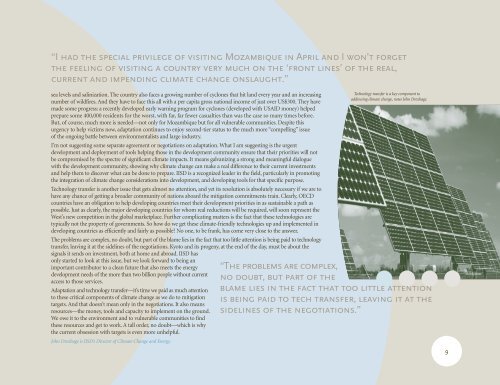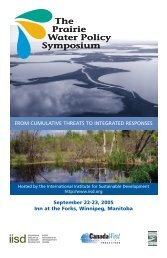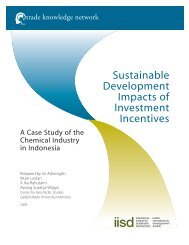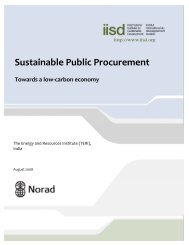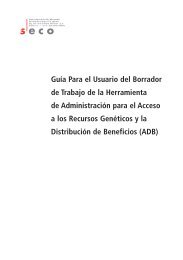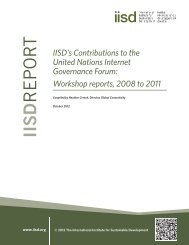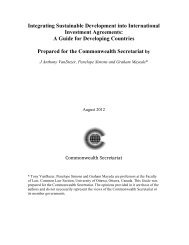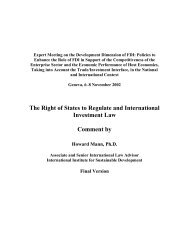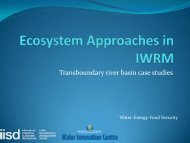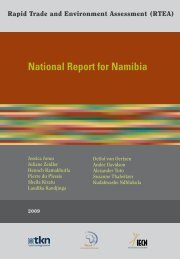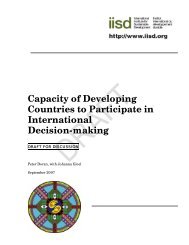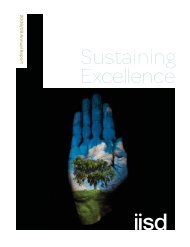2006/2007 Annual Report - International Institute for Sustainable ...
2006/2007 Annual Report - International Institute for Sustainable ...
2006/2007 Annual Report - International Institute for Sustainable ...
Create successful ePaper yourself
Turn your PDF publications into a flip-book with our unique Google optimized e-Paper software.
“I had the special privilege of visiting Mozambique in April and I won’t <strong>for</strong>get<br />
the feeling of visiting a country very much on the ‘front lines’ of the real,<br />
current and impending climate change onslaught.”<br />
sea levels and salinization. The country also faces a growing number of cyclones that hit land every year and an increasing<br />
number of wildfires. And they have to face this all with a per capita gross national income of just over US$300. They have<br />
made some progress: a recently developed early warning program <strong>for</strong> cyclones (developed with USAID money) helped<br />
prepare some 400,000 residents <strong>for</strong> the worst, with far, far fewer casualties than was the case so many times be<strong>for</strong>e.<br />
But, of course, much more is needed—not only <strong>for</strong> Mozambique but <strong>for</strong> all vulnerable communities. Despite this<br />
urgency to help victims now, adaptation continues to enjoy second-tier status to the much more “compelling” issue<br />
of the ongoing battle between environmentalists and large industry.<br />
I’m not suggesting some separate agreement or negotiations on adaptation. What I am suggesting is the urgent<br />
development and deployment of tools helping those in the development community ensure that their priorities will not<br />
be compromised by the spectre of significant climate impacts. It means galvanizing a strong and meaningful dialogue<br />
with the development community, showing why climate change can make a real difference to their current investments<br />
and help them to discover what can be done to prepare. IISD is a recognized leader in the field, particularly in promoting<br />
the integration of climate change considerations into development, and developing tools <strong>for</strong> that specific purpose.<br />
Technology transfer is another issue that gets almost no attention, and yet its resolution is absolutely necessary if we are to<br />
have any chance of getting a broader community of nations aboard the mitigation commitments train. Clearly, OECD<br />
countries have an obligation to help developing countries meet their development priorities in as sustainable a path as<br />
possible. Just as clearly, the major developing countries <strong>for</strong> whom real reductions will be required, will soon represent the<br />
West’s new competition in the global marketplace. Further complicating matters is the fact that these technologies are<br />
typically not the property of governments. So how do we get these climate-friendly technologies up and implemented in<br />
developing countries as efficiently and fairly as possible? No one, to be frank, has come very close to the answer.<br />
The problems are complex, no doubt, but part of the blame lies in the fact that too little attention is being paid to technology<br />
transfer, leaving it at the sidelines of the negotiations. Kyoto and its progeny, at the end of the day, must be about the<br />
signals it sends on investment, both at home and abroad. IISD has<br />
only started to look at this issue, but we look <strong>for</strong>ward to being an<br />
important contributor to a clean future that also meets the energy<br />
development needs of the more than two billion people without current<br />
access to those services.<br />
Adaptation and technology transfer—it’s time we paid as much attention<br />
to these critical components of climate change as we do to mitigation<br />
targets. And that doesn’t mean only in the negotiations. It also means<br />
resources—the money, tools and capacity to implement on the ground.<br />
We owe it to the environment and to vulnerable communities to find<br />
these resources and get to work. A tall order, no doubt—which is why<br />
the current obsession with targets is even more unhelpful.<br />
John Drexhage is IISD’s Director of Climate Change and Energy.<br />
Technology transfer is a key component to<br />
addressing climate change, notes John Drexhage.<br />
“The problems are complex,<br />
no doubt, but part of the<br />
blame lies in the fact that too little attention<br />
is being paid to tech transfer, leaving it at the<br />
sidelines of the negotiations.”<br />
9<br />
iStockphoto


